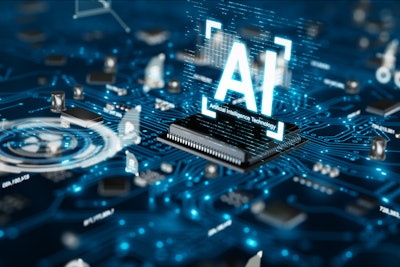
Artificial intelligence’s (AI) role in the business landscape has continued to grow. This is especially true when it comes to optimizing supply chains and business processes. The potential for AI to meet surging demand and transform supply chain operations can provide businesses confidence that they can stay ahead of the curve in a hyper-competitive market.
Here are seven ways AI is reshaping the supply chain industry and revolutionizing how organizations conduct their day-to-day operations to improve productivity and efficiency.
Enhanced Visibility
In the supply chain industry, one of the most common challenges businesses experience is the ability to maintain visibility and transparency. AI-powered solutions provide insights into the entire supply chain network, from raw material sourcing to distribution and delivery – a capability never seen before. With this, advanced machine learning algorithms allow businesses to analyze real-time data to make informed and educated decisions while identifying any present bottlenecks and potential risks.
With AI-driven analytics, organizations are provided with the opportunity to predict and mitigate disruptions before they impact business operations, ensuring preventative action is taken and downtime is minimized. This level of visibility allows organizations to optimize inventory management better, reduce excess stock and enhance the overall efficiency of their operations.
Predictive Forecasting
AI can improve data forecasting by providing a comprehensive look at historical data, customer behavior, market trends and additional external factors. Because traditional forecasting methods tend to fall short in accurately anticipating fluctuating demands, AI-driven predictive models serve to fill this gap. With their ability to quickly adapt and self-improve, increasingly accurate forecasting is received. When organizations can anticipate demand, they can better optimize production timelines, reduce overhead inventory costs and avoid stock shortages. AI-powered forecasting empowers businesses to capitalize on emerging opportunities and stay ahead in demanding markets.
Improved Inventory Management
Intelligent inventory management allows businesses to maintain the proper levels of inventory – which has always been a balancing act in the industry. When inadequate stock levels are present, excessive inventory amounts tie up capital, leading to lost sales and dissatisfied customers. With the use of AI-based inventory management software, businesses can find the inventory count sweet spot.
AI can help assess historical sales data, seasonal trends and other factors and recommend the optimal stock levels to predict reorder points. In addition, AI can identify slow-moving or obsolete items in the chain, allowing businesses to make data-driven decisions about markdowns or liquidations to free up warehouse space and capital.
Autonomous Supply Chains
The integration of AI has led to the creation of autonomous supply chain systems. With the use of smart devices and sensors that collect data in real-time and AI-driven algorithms, data is processed autonomously, leading to quicker decision-making and precise action-taking in reduced time. This enables IT teams to move away from the mundane task of collecting and analyzing data and focus on more high-level projects. Such systems reduce operational costs, improve accuracy and free up employees to focus on more strategic tasks.
Risk Management and Resilience
In the present global economy, supply chains are vulnerable to numerous risks ranging from natural disasters to geopolitical uncertainties. AI provides advanced risk management solutions as it continuously analyzes and monitors data to identify potential threats. Through risk assessment solutions, organizations can craft plans and respond promptly to unexpected occurrences. Because of its ability to simulate scenarios, organizations have an aid to help assess the potential impact of various risks and make informed decisions based on information gathered.
Personalized Customer Experience
Not only is AI transforming supply chains and business processes, but it is reshaping the customer experience. When organizations leverage AI-driven analytics, they can gain a deeper understanding of customer preferences, behaviors and purchasing patterns. Such insights allow organizations to better determine offerings, personalize services and improve customer satisfaction rates.
Case in point: AI-powered chatbots and virtual assistants provide instantaneous support, addressing customer queries and issues quickly. This model of 24/7 support drastically improves customer service and reduces the need for human intervention for simple and redundant inquiries.
Streamlined Business Processes
In addition to improving the supply chain, AI is restructuring internal business processes across numerous departments. In HR, AI-driven recruitment platforms streamline candidate identification and sourcing – making the hiring processes efficient and effective. While, AI-powered financing solutions help to automate generic tasks like expense reporting and invoicing – improving accuracy and freeing up time.
Additionally, AI has the ability to optimize production processes, automate quality control and enhance the overall operational efficiency of organizations. When manual bottlenecks are removed and replaced with AI, workflows are streamlined, resulting in the achievement of increased productivity and cost savings.
It’s no surprise that AI has an immense impact on organizations across all industries. However, AI’s impact on supply chains and business processes continues to improve the trajectory in which both go. AI has the power to revolutionize the way businesses operate, think about the future and mitigate threats – enabling them to stay ahead of their competition. When used properly or in conjunction with the right outsourced technology partner, AI can bring improved visibility, enhanced forecasting and more to meet the surging demand supply chain is experiencing.
While the thought of embracing AI can be overwhelming at times, when viewed as an imperative and beneficial decision, organizations have the opportunity to achieve sustainable growth and success over their competitors in a rapidly changing environment. As technology continues to advance, so will leading-edge AI solutions, allowing organizations to continue to flourish in this era of digital transformation.




















